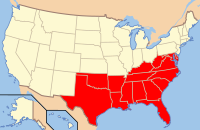
Photo from wikipedia
So-called Voting Advice Applications, commonly referred to as VAAs, have become a staple complement to election campaigns in democratic societies worldwide. VAAs comprise a particular class of online instruments that… Click to show full abstract
So-called Voting Advice Applications, commonly referred to as VAAs, have become a staple complement to election campaigns in democratic societies worldwide. VAAs comprise a particular class of online instruments that purport to measure individual users’ level of agreement with a set ideological or policy propositions under contest by parties in a given election campaign. On the basis of their responses, VAAs offer each user a real-time rendering of their individual alignment with the parties on offer. They have proven in many cases a wildly popular resource mirroring, whether intentionally or not, the style and mode of diffusion of online quizzes popularised by viral content websites. Their uptake has been remarkable, in some cases amassing millions of users during the course of an election campaign (Garzia and Marschall 2012). The increasing prevalence and uptake of VAAs warrants critical inquiry into their implications for democratic citizenship. We refer to implications both in the sense of potential repercussions of these applications for electoral outcomes, but also in terms of the latent assumptions embedded in their design. Already a burgeoning literature has set out to examine the effects of VAAs, if any, for political behaviour (Alvarez et al. 2014; Gemenis and Rosema 2014; Enyedi 2015) as well as both the tacit and explicit consequences of their design (Louwerse and Rosema 2013; Lefevere and Walgrave 2014). Given their implications for electoral politics, VAAs have occupied a growing number of political scientists not only in their capacity as researchers, but also as practitioners. Many popular VAAs are developed by political scientists, a number of whom are themselves contributors to this special issue. VAAs thus represent a relatively rare instance in which the work of political scientists directly engages the public en masse. This casts political scientists in a dual role as both analysts and architects of an emergent socio-political phenomenon. It also offers a case study in a large-scale, public-facing application of both qualitative and quantitative methods in political science. All this imposes a special responsibility on the political science community,
Journal Title: Journal of Elections, Public Opinion and Parties
Year Published: 2017
Link to full text (if available)
Share on Social Media: Sign Up to like & get
recommendations!